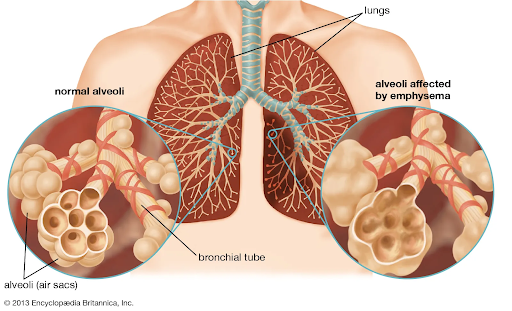Chronic Obstructive Pulmonary Disease (COPD) is a progressive lung condition that makes breathing difficult over time. It affects millions of people worldwide, with India being one of the most severely impacted countries. According to the Global Burden of Disease Study, India accounts for nearly 32% of global COPD deaths, making it a significant public health concern.
With increasing air pollution, smoking habits, and occupational exposure to harmful particles, COPD cases in India continue to rise. Early awareness, symptom management, and air quality improvements are key to reducing its impact.
What is COPD?
COPD is a group of chronic lung diseases, primarily including chronic bronchitis and emphysema, that cause airflow obstruction and breathing difficulties. Unlike asthma, which can be reversible, COPD worsens over time and has no permanent cure.
Key Facts About COPD in India:
- India has the second-highest number of COPD cases globally, with over 55 million people affected.
- According to the Lancet Report, COPD-related deaths in India have increased by 34% over the last two decades.
- Exposure to household air pollution (such as biomass smoke) is a major contributing factor, especially in rural areas.
Causes of COPD
COPD develops due to long-term exposure to irritants that damage the lungs. The most common causes include:
- Smoking & Tobacco Exposure – Around 70% of COPD cases in India are linked to active or passive smoking.
- Air Pollution – In cities like Delhi, Mumbai, and Kolkata, prolonged exposure to PM2.5 pollution increases COPD risk by 30%.
- Occupational Hazards – Workers in construction, mining, and textile industries inhale dust, chemicals, and fumes that damage lung tissue.
- Indoor Pollution – In rural India, over 60% of households use biomass fuels (wood, cow dung, coal) for cooking, leading to long-term lung irritation.
-
Genetic Factors – Some individuals may inherit Alpha-1 Antitrypsin Deficiency, a rare condition that increases COPD susceptibility.
Symptoms of COPD
COPD symptoms often appear gradually and worsen over time. Early diagnosis is crucial to managing the disease effectively.
Common Symptoms Include:
- Chronic Cough – Persistent coughing with mucus production.
- Shortness of Breath (Dyspnea) – Especially during physical activity.
- Wheezing & Chest Tightness – Increased difficulty in breathing.
- Frequent Respiratory Infections – Higher risk of pneumonia and bronchitis.
- Fatigue & Weakness – Reduced oxygen supply leading to tiredness.
-
Unintentional Weight Loss – In later stages, due to increased energy use during breathing.
Effects of COPD on Daily Life
COPD not only affects lung function but also has a significant impact on daily life and overall well-being.
- Reduced Physical Activity – Breathlessness makes simple activities like climbing stairs difficult.
- Mental Health Challenges – Studies show that 40% of COPD patients experience anxiety and depression.
- Increased Healthcare Costs – Frequent hospital visits, medications, and oxygen therapy can be financially burdensome.
- Higher Mortality Risk – COPD is the third leading cause of death worldwide, with a rising trend in India.
How to Manage COPD & Improve Air Quality
While COPD cannot be fully cured, lifestyle changes and air quality improvements can significantly slow its progression.
Effective Ways to Manage COPD:
Chronic Obstructive Pulmonary Disease (COPD) requires proactive lifestyle changes to improve lung function, reduce flare-ups, and enhance quality of life. Here’s how you can manage COPD effectively:
- Quit Smoking – The #1 cause of COPD progression; quitting can slow lung deterioration.
- Medication Management – Follow prescribed bronchodilators, steroids, and inhalers to keep airways open.
- Pulmonary Rehabilitation – Improves breathing techniques, endurance, and lung capacity through guided therapy.
- Oxygen Therapy – Helps maintain optimal oxygen levels, reducing breathlessness and fatigue.
- Stay Active – Low-impact exercises like walking and yoga can strengthen respiratory muscles.
- Healthy Nutrition – A balanced diet rich in antioxidants supports lung health and reduces inflammation.
- Avoid Environmental Triggers – Minimize exposure to pollution, allergens, and respiratory irritants.
- Manage Stress & Anxiety – Relaxation techniques like deep breathing and meditation improve lung efficiency.
- Regular Checkups – Frequent doctor visits help monitor symptoms and adjust treatment plans accordingly.
Prioritizing Lung Health
COPD is a growing health crisis in India, with millions affected due to air pollution, smoking, and occupational hazards. Raising awareness, early diagnosis, and improving air quality are crucial to managing symptoms and slowing disease progression.
By making conscious lifestyle choices and reducing exposure to harmful pollutants, individuals can take control of their respiratory health and improve their quality of life.
✅ Take steps today to protect your lungs and breathe better for a healthier future with atovio Pebble!






Share:
The Link Between Air Quality & Mental Health: Why Clean Air Matter
How Smoking Takes a Toll on Your Heart and Lungs
3 comments
I was diagnosed with Idiopathic Pulmonary Fibrosis (IPF), and it drastically affected my life. I became dependent on oxygen tanks just to get through the day, and simple tasks felt impossible. After months of struggling, I reached out to www. earthcureherbalclinic. com via Info @ earthcureherbalclinic .com. Their team was incredibly supportive, and I began their herbal treatment plan. To my amazement, after just a few months of consistent treatment, I noticed significant improvements in my health. The most remarkable change is that I am no longer using oxygen tanks and I am fully free from the symptoms of IPF. I’ve even been able to return to work and live my life like I did before my diagnosis. I’m so grateful for the care and effectiveness of Earth Cure Herbal Clinic, their treatment really changed my life for the better.
BSW Finasteride: BSW Finasteride – BswFinasteride
get generic propecia without dr prescription https://bswfinasteride.xyz/# BSW Finasteride